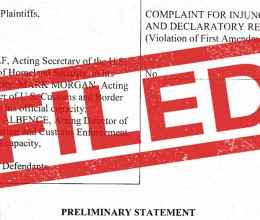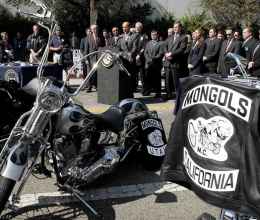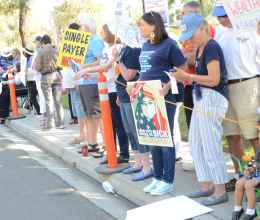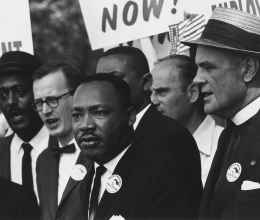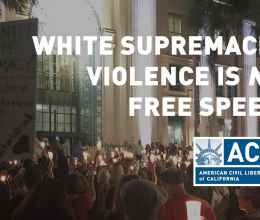FOR IMMEDIATE RELEASE
San Diego - Just shy of a half-century later, the San Diego Unified school board is apologizing to Pete Seeger for insisting he sign a loyalty oath before performing at a San Diego high school auditorium in 1960. At the time, ACLU of San Diego attorneys successfully represented Seeger in challenging the requirement. Today, the ACLU is still fighting loyalty oaths in California. A bill before the legislature SB 115 (Lowenthal), would allow people with religious or moral objections to forego swearing the state-mandated loyalty oath required for public employment.
At the San Diego Unified school board meeting tonight, Tuesday, February 10, 2009, board member Katharine Nakamura will introduce a resolution offering an apology to "one of our dearest national treasures," declaring that the board "deeply regrets its predecessors' actions."
In a written statement acknowledging the school board's apology, Seeger said, "It is a measure of justice that our right to freedom of expression and association has been vindicated." He expressed concern, however, about California’s ongoing requirement to sign loyalty oaths and urged passage of SB 115.
“It is shocking and appalling to average, everyday people that loyalty oaths still exist and are still doing damage,” said Kevin Keenan, Executive Director of the ACLU of San Diego & Imperial Counties. “It is time to do away with this relic of a repressive era and make sure these oaths never come back.”
The issue came to light most recently when a Quaker was offered a teaching job at Cal State Fullerton but lost it because she could not sign the California loyalty oath swearing to defend the U.S. and California constitutions without attaching a brief statement clarifying her views. As a Quaker and lifelong pacifist, she felt the oath was an infringement of her free speech and religious freedom. A few months earlier, another Cal State lecturer was fired because she inserted the word “nonviolently” when she signed the oath. (She has since been reinstated.) And in 2001, a Cal State lecturer was fired when he refused to sign, though he was a Jehovah’s Witness who believed that swearing an oath to anyone but God violated his religious beliefs. There are many other examples.
The San Diego ACLU has challenged loyalty oaths almost since its founding more than 75 years ago. In 1935, ACLU San Diego founder Helen Marston served as plaintiff in an ACLU challenge to a Board of Education loyalty oath required to use a school auditorium for a public forum about the Constitution. Decades later, the case Danskin v. Board of Education of San Diego (1957) challenged another iteration of the board’s oath and stands as important legal precedent for the requirement that a privilege, once generally granted by a public body, must be provided equally.
Seeger was blacklisted for decades for his refusal to yield to demands from the House Un-American Activities Committee to take a loyalty oath, where he challenged the red-baiting committee by invoking the First Amendment. He was the only person called before HUAC to insist on his First Amendment right, rather than the Fifth Amendment right to refuse to testify.
In the 1950s and 1960s, banned from bigger venues, Seeger performed across the nation in school auditoriums. When he came to San Diego in 1960 to play in a rented Hoover High School auditorium, the San Diego school board insisted that he sign a non-communist loyalty oath to use the building. The oath read in part,
The undersigned states that, to the best of his knowledge, the school property… will not be used for the commission of any act intended to further any program or movement the purpose of which is to accomplish the overthrow of the government of the United States by force, violence, or other unlawful means … and is not a Communist-action organization or a Communist-front organization required by law to be registered with the attorney general of the United States.
As in the HUAC hearings, Seeger refused to take the San Diego oath on principle. ACLU Attorneys Irwin Gostin and Lou Katz were contacted on a Friday, and, on Saturday morning, won an injunction against the school district. Seeger attended that hearing with a guitar and banjo in hand, planning to perform as part of his testimony. His attorneys were nervous that the judge, with a reputation for being conservative, would not take well to such testimony, but learned after the decision that Judge Clarence Harden was a big fan of folk music and would have loved it.
SB 115
http://www.leginfo.ca.gov/pub/09-10/bill/sen/sb_0101-0150/sb_115_bill_20090129_introduced.pdf
San Diego Union-Tribune article, 2/10/09
Pete Seeger Statement on School Board's Apology
seeger statement on SDUSD apology.pdf


